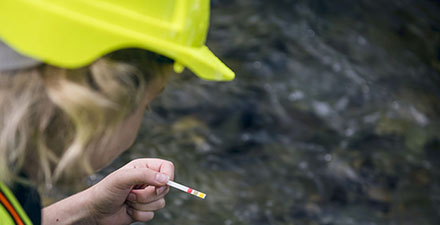OneFortyOne’s annual water testing program has confirmed its forestry operations are having minimal impact on the Limestone Coast environment. Each winter, OneFortyOne conducts water testing at between 10 and 15 sites to determine whether herbicides applied to control weeds when pine seedlings are planted, are having any off-site effects. Source: Timberbiz
OneFortyOne Research Manager Danielle Wiseman said the company conducted water testing to protect the environment and ensure the controls it has in place to prevent off-target effects of herbicides are working.
“The water monitoring program is designed to detect chemical trespass, provide feedback regarding the efficacy of current management practices and highlight improvement opportunities,” she said.
“Water monitoring is conducted as part of the Australian Standard for Sustainable Forestry Management certification, but it is not a legislative requirement.”
Dr Wiseman said OneFortyOne’s policy was to have minimal adverse impact on the environment through its forest management activities and to protect the water resources in the region in which it operates.
“We use herbicides to control weeds when we plant the pine seedlings,” she said.
“We need to remove the competition the weeds create so the seedlings can get established.
“After about 12 months, we usually don’t apply any more herbicide for the duration of the 32-year rotation.”
Dr Wiseman said OneFortyOne places a high value on protecting the environment and ensuring there was biodiversity within its plantations.
“OneFortyOne manages its operations to protect or enhance conservation values of native vegetation on or adjacent to our estate to protect rare and endangered species,” she said.
“Within the Green Triangle pine plantation estate, there is approximately 2,700 hectares of protected remnant vegetation, wetlands and caves.
“These areas provide a home for more than 80 different threatened species some of which are transient users of the pine plantations.
“Managing forests sustainably, and restoring them when needed, is crucial for people, biodiversity and climate.”






